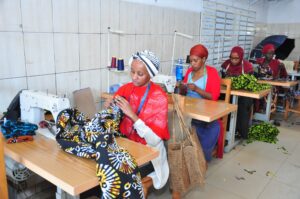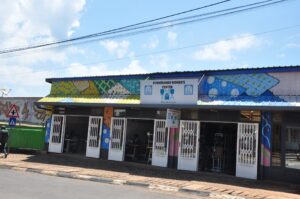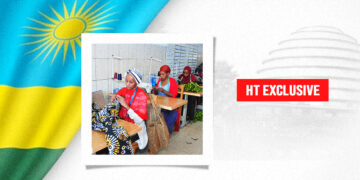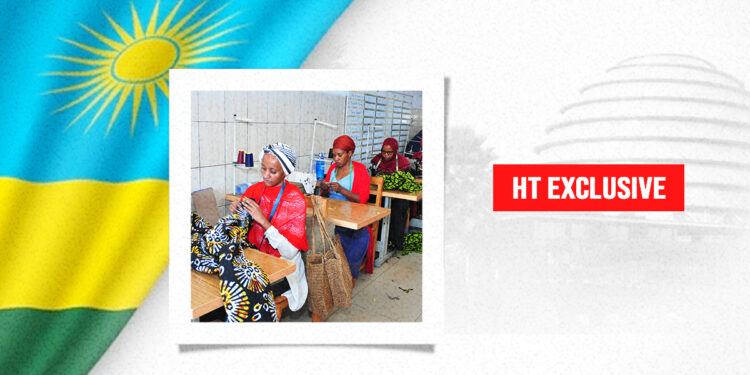By Elie Mutangana
In 2007, a group of 18 women and girls were in entanglement, thinking of their endeavors for transforming their community as a dedicated group of women, but with limited means of venturing into something at the time. Driven by the fact they were residing in Nyamirambo, a famous populous neighborhood in Kigali, capital city of Rwanda, their critical objective was to address gender-based violence, gender inequality and discrimination against women that could be testified in the neighborhood.
In fact, being a group and the togetherness was itself a means for them to conduct an intervention that could forge changes in the community.
The women thought of numerous initiatives to undertake for uprooting the constraints affecting women to thrive. Before they could have thought many things, they found three of the members of them who could neither read nor write.

Consequently, the rest of the members who had gone to school aimed to teach their colleagues for leveling up their capacity before continuing the mission together as a group.
From that time, one among the issues hindering some women in the neighborhood had come to their mind. They thought of other women in the area with similar issue.
Without hesitating, the women officially started the association and named it “Nyamirambo Women Center”, specially to volunteer teaching women and girls with the inability to read or write.
They started to collaborate with local leaders to outreach to individuals, mainly women with inability to pay for such trainings on their own to benefit from their initiative and to enable them gain opportunities and capacity for employment.
READ ALSO: Reopening Of Niger’s Border With Nigeria: X-raying The Economic Implications
Initially, they started outreaching the beneficiaries at different spots such as at public offices, through the unwavering partnership with local leaders. The other option was also to set up the class at a member’s home. The group had not afforded to own a promise for establishing classrooms.
Fortunately, in 2008, the association connected with Slovenian researchers who were in Rwanda for research on gender equality and women development in Rwanda. The researchers commended their initiative and pledged to collect support for the association upon arriving in their home country.

“We had a chance of meeting those Slovenians. We introduced ourselves to them and pitched our goals. They felt interested in our ambitions and pledged to support to enable us rent a workplace. Upon arriving in Europe, they sent us donation that we used for renting classrooms,” Mary Nyangoma, member of Nyamirambo Women Center and acting manager told Heritage Times HT in an exclusive interview.
She emphasized that receiving the donation catalyzed their enthusiasm in stretching their efforts to other beneficiaries for scaling impact to the community. Apart from offering free classes of literacy, Mary added that they started to include other vocational training programs including handcraft, sewing, hairdressing and other empowerment trainings on gender-based violence.
“From the donation, we employed teachers to train our beneficiaries for free. We had found that illiteracy was not only the problem hampering women and girls, but also practical expertise was indeed needed.”
Recounting his testimony, Daniel Uwiragiye who had been unable to read or write acknowledges changes to his life after completing the class of literacy. He recounts that he encountered struggles in the city owing to the fact that he couldn’t read or write.
“I was struggling to read different sign posts on the streets. I could end up being lost due to the fact I didn’t know to read”. He said, attributing the situation to splits between his parents that prevented him from attending school at young age.
His colleague Nura Mutoni, who trained on hairdressing at the women’s center also recounts that her situation has obviously changed compared to before joining the training. She reveals that she couldn’t vision her future before, because she hadn’t any practical expertise to do anything for earning incomes. She stresses that the initiative created decent employment to many people.
“It was very hard for me to find something to earn me money while I had many needs as a girl. This posed me to be reliant on other people. But after getting trained, I came to know how to dress hair. I have already started earning money from it. For example, I have started receiving people in the neighborhood who came for the service. The pay me money which I use for my daily expenses”.
Embarking on generating income.
While narrating the story, Mary, the manager of the association narrated that in 2023, the group connected with a Swiss woman who was in Rwanda for holidays. She also got interested in their initiative. She later advised them to think of an income-generating activity at the center that can sustain the initiative and earn living for the trainees upon completion.
“She advised us to form a cooperative within our association to encompass aspiring trainees for utilizing their skills together and make some products for sales. We definitely welcomed the idea, but we couldn’t afford it by the time because it required us to buy more sewing machines and enlarge the workplace”
“But we were so fortunate and blessed as well, the white woman donated us money to afford it and expand our activities. We finally formed a cooperative and named it ‘Umutima’.” Mary said, explaining that they picked the local name “Umutima”, translated to “Heart”, because a woman is literally considered as the heart of the family.
With this cooperative, the members use their crafts to create a large variety of accessories, children and women’s clothing and other home decor products. At the moment, there are over 50 women and few men employed by Umutima while
“We have entered in MICE industry where we offer different services in different events and conferences happening in Rwanda using our crafts. We have contracts with different event’s organizers where we provide conference bags and other accessories”.
Consolle Mukagasana, a seamstress who initially joined the cooperative after completing sewing trainings explains the importance of working in cooperatives.
She highlights that it provided her a significant economic transformation as well as sense of belongingness.
“I can say that I got an address. I usually wake up in the morning going to job like others in the city. Most importantly, working with other like this of ours is absolutely helpful. You feel like you have a second home where you meet your colleagues who understand you and can help you in case you need a certain help”.
She added, “Before being part of the cooperative, I had no means to touch money. I was always relying on my husband every time I needed something. But now, history has changed. I have a monthly source of income that I use for my daily needs. I am now complementing my husband to provide needs for our children”.
Diversification of offerings.
The Nyamirambo Women Center and its Umutima cooperative of today have grown into unique, self-sustaining model by adding different offerings for earning more profits for funding their initiatives as well as providing benefits and fair salaries to the seamstress and other workers.
This has earned them self-reliance, sustainability and strengthened their reputation in the community.
They have adhered principles of Responsible Community Based Tourism (CBT), where the women provide tours to tourists for giving them a unique personal insight into everyday life, local social culture and night vibes of the busy Nyamirambo township.
Furthermore, tourists are provided with cooking workshops of local dishes, join handcraft with women at the center and track a unique Nyamirambo- Mount Kigali adventure for capturing a captivating view of the Kigali city.
In alignment with government ambitions of mobilizing Early Childhood Development Centers (ECDCs) program, Nyamirambo Women Center plans to introduce an ECDS for providing early childhood education, protection, hygienic care and good feeding to children whose would be working or getting trainings at the center.
“We have many trainees and seamstresses who have kids and it is obviously difficult for them to learn or work while holding a kid. For that, we are planning to start an ECDC and bring professional babysitters who would be taking care of the kids while parents are learning and others working,” Mary said.
So far, the center introduced a community library that offers books in English, Kinyarwanda and French. According to Mary, the aim behind the library is to encourage reading culture among children, promote literacy to align with “One child, one book” idea in Rwanda.




































